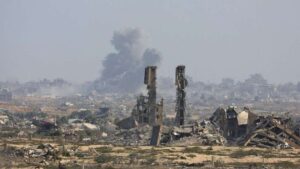Palestinians Mark Holiest Ramadan Night with Sacrifice for Al-Aqsa

East Jerusalem, The Gulf Observer: Palestinian Muslims observed a solemn and tense last Friday of Ramadan in occupied East Jerusalem as Israeli occupation police maintained control over the entrance to the Al-Aqsa Mosque compound, the revered third holiest site in Islam. Amid scuffles between worshippers and Israeli forces, a somber atmosphere prevailed, reflecting the ongoing conflict in the region.
Officials reported that approximately 120,000 worshippers congregated at the Al-Aqsa Mosque, an iconic landmark dominating the Old City. Grand Mufti Muhammad Ahmad Hussein urged the faithful to persevere despite the heavy police presence, citing the conflict in Gaza as a backdrop to their prayers.
Adli al Agha, a resident of occupied East Jerusalem, recounted the harrowing experience as worshippers were forced to disperse during dawn prayers. Israeli police deployed a mini-drone equipped with tear gas, compelling many to flee. Amidst the chaos, chants of “Glory to God” echoed through the air, reflecting the steadfast devotion of the worshippers.
Yasser Basha, hailing from Tulkarem in the Israeli-occupied West Bank, lamented the restrictive measures imposed by the police, allowing only the elderly and young children to enter the mosque premises. He expressed that the ongoing war exacerbated the situation, making access to the mosque even more challenging.
The significance of the day was heightened as it coincided with Laylat al-Qadr, also known as “The Night of Power,” considered the spiritual zenith of Ramadan. This sacred occasion commemorates the revelation of the Holy Quran to Prophet Muhammad (Peace be Upon Him) by the archangel Gabriel. Despite its festive connotations, the mood among Palestinians was subdued, with prayers for an end to the brutal conflict in Gaza dominating the collective consciousness.
Traditionally, Laylat al-Qadr is a time of fervent prayer and reflection, with Muslims believing their supplications are most likely to be answered. However, against the backdrop of prolonged bloodshed and unrest, many Palestinians found it difficult to partake in the customary celebrations.
As the sun set on the last Friday of Ramadan, the prayers of Palestinians resonated with a collective hope for peace and an end to the cycle of violence that has plagued the region for far too long.


